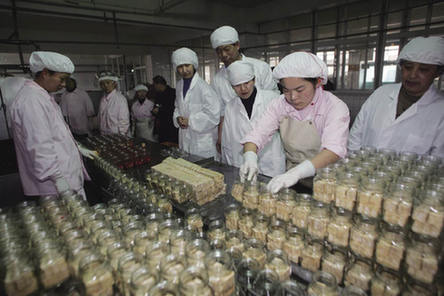| Wangzhihe: Overseas Lawsuit a Model for Infringed Trademarks
By staff report LU RUCAI
AFTER a 27-month lawsuit, Wang Jiahuai, general manager of Beijing Wangzhihe Food Group, recently won his trademark-infringement lawsuit against a German supermarket. Wang's case has generated much media interest since late April, and his success has provided a confidence boost for many other Chinese companies who face the same problem.
Time-honored Trademark Infringed
|
 |
|
A modern Wangzhi plant continuing a legacy begun in 1669. China Foto Press |
Established in 1669, Wangzhihe is a household brand in China, its preserved beancurd a life necessity for many people. The company's sales amounted to RMB 729 million in 2008.
Beginning in 2000, Wangzhihe started to explore overseas markets, soon forming stable customer bases in the U.S., Canada, and other countries with Chinese populations. But an unexpected problem arose in June 2006. Wang Hongqing, the company's trademark lawyer, found "Wangzhihe" had already been registered in Germany by Okai, a supermarket selling goods imported from China.
"As they had already registered 'Wangzhihe,' we couldn't sell any products in Germany, or we would be accused of trademark infringement," said General Manager Wang. "In that case, our products might be destroyed, which would be a nightmare." Furthermore, Okai would probably produce goods using his brand name.
"Working with the idea that 'harmony is most precious,' we sent a lawyer's letter to ask them to give back the trademark in Germany." As general manager of a company immersed in traditional culture, Wang Jiahuai has always reiterated the idea of harmony. However, he didn't get any response. The company finally decided to sue Okai in Germany to retrieve its intellectual property.
"When we made the decision, we knew there was no question about our success. The infringement should be punished." On January 26, 2007, the Munich Local Court accepted and heard the case. The first judgment was made ten months later, forbidding Okai to use the trademark "Wangzhihe" in Germany without permission, and repealing the trademark Okai had preemptively registered.
"Once the trademark Okai registered was repealed, Wangzhihe's application could be approved." The news made Wang Jiahuai and Wang Hongqing very excited. They went all the way to Germany for the judgment.
But things didn't go as smoothly as they expected. Okai appealed to the Munich Superior Court on February 25, 2008. "After careful analysis, we concluded that Okai was stalling for time, even though they knew the chances of winning were slim."
Worth the Effort
At 9 am Munich time on April 23, 2009, the Munich Superior Court reached a decision: Okai should not use "Wangzhihe" without permission and should remove its trademark, otherwise it would be fined 250,000 euros and the person in charge punished with a six-month prison term.
"It was a threat of quite severe punishment," says Wang Jiahuai. The main aim for his company – preventing Okai using their trademark and repealing Okai's registration – had been achieved.
Infringements involving Chinese enterprises occur much more often now that they are moving into overseas markets. But few use the law to protect their rights. One of the reasons is the cost of bringing a lawsuit. But Wangzhihe's big win could inspire other companies, says Wang Jiahuai.
During the two year lawsuit, the biggest expense was the German lawyer's retaining fee. Most of the preparation was done by Chinese lawyers and the company itself, which saved a large sum of money. "The fee we paid to the German lawyer totaled 20,000 euros, which we could easily afford."
"Cost is not the only factor we take into account," added Wang. "What we've obtained is worth far more than the costs." Wangzhihe's win is a declaration of the company's resolution to protect its rights by means of the law, thereby decreasing the likelihood of future infringements.
Besides Wangzhihe, six other mainland food company trademarks, like Baijia vermicelli and Qiaqia melon seeds, have been preemptively registered by Okai. "The other companies hadn't sued yet, but they supported Wangzhihe's action." In 2007, Qiaqia, Baijia and another two infringed companies provided statements claiming that Okai had used their registered trademarks without permission.
| 